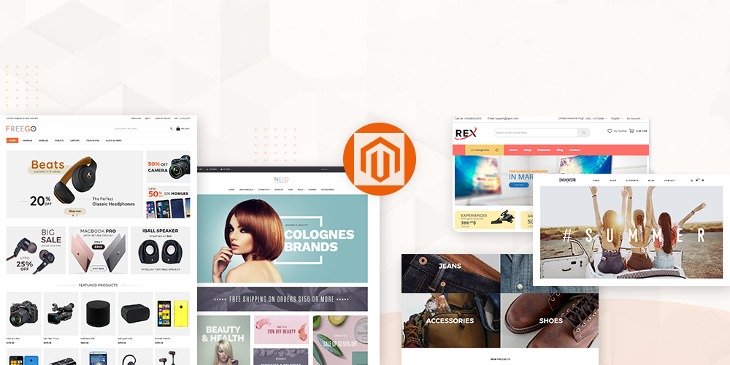When was the last time you evaluated your e-commerce store from a customer’s perspective? If your bounce rates are high and conversions are lower than expected, your website’s user experience (UX) might be the culprit. A seamless, intuitive, and engaging UX isn’t just a bonus, it’s the key to keeping users engaged and driving sales.
According to studies, 88% of online shoppers won’t return to a website after a poor user experience. That’s a staggering statistic, highlighting just how crucial it is to get your Magento store’s UX right. One of the most effective ways to achieve this is by leveraging Custom Magento Themes tailored to your audience’s needs and expectations.
Why Default Magento Themes Fall Short
Magento’s default themes provide a solid foundation, but they lack the flexibility and personalization that modern shoppers expect. Here’s why they might not be enough:
- Generic Design – Default themes follow a one-size-fits-all approach, which can feel uninspired and fail to reflect your brand identity.
- Limited Customization – While some elements can be tweaked, major design overhauls are difficult without a custom-built theme.
- Performance Issues – Pre-built themes often come with unnecessary features that can slow down page speed, negatively impacting user experience.
To truly differentiate your store and enhance user engagement, a custom Magento theme is the way forward.
The Role of Custom Magento Themes in UX Enhancement
A well-designed Custom Magento Theme does more than just look aesthetically pleasing, it actively improves usability, functionality, and performance. Here’s how:
1. Optimized Navigation for Seamless Browsing
Users should be able to find what they’re looking for within seconds. A custom Magento theme allows you to design an intuitive navigation structure that aligns with your product catalog. Whether it’s implementing mega menus, breadcrumbs, or sticky headers, customization ensures that users enjoy a frictionless browsing experience.
2. Faster Page Load Speeds
Speed is non-negotiable. A custom theme eliminates unnecessary code bloat and optimizes scripts and images, significantly reducing load times. Studies show that a one-second delay in page load time can reduce conversions by 7%—a clear indicator that every millisecond counts.
3. Mobile-First Design for Better Accessibility
With mobile commerce booming, your Magento store needs a responsive design that adapts seamlessly to any screen size. A custom theme ensures that elements like buttons, images, and forms are mobile-friendly, enhancing the shopping experience for smartphone users.
4. Personalized User Interface (UI) and Branding
Your website should be an extension of your brand. A custom theme allows you to implement unique color schemes, typography, and layouts that reflect your business’s identity. This level of personalization not only makes your store more visually appealing but also builds brand recognition and trust.
5. Enhanced Checkout Experience
Cart abandonment is a major concern in e-commerce. A custom Magento theme lets you streamline the checkout process by reducing form fields, enabling one-click checkout, and integrating multiple payment options. The easier you make it for customers to complete their purchase, the higher your conversion rates.
How Custom Magento Themes Improve Conversion Rates
A better user experience directly translates to improved conversions. Here’s why investing in a custom theme pays off:
- Higher Engagement – A visually appealing and easy-to-navigate site keeps users browsing longer, increasing the likelihood of a purchase.
- Reduced Friction – Simplified navigation, fast load speeds, and a seamless checkout remove barriers that often lead to abandoned carts.
- Better SEO Performance – Custom themes are built with clean code, structured data, and optimized images, all of which contribute to higher search rankings and increased organic traffic.
Implementing a Custom Magento Theme: Best Practices
If you’re considering a custom theme for your Magento store, here are some best practices to follow:
1. Start with UX Research
Understanding your audience’s preferences and behavior is crucial. Analyze heatmaps, gather customer feedback, and review analytics to pinpoint UX pain points before designing your custom theme.
2. Prioritize Speed and Performance Optimization
From using lazy loading techniques to minimizing HTTP requests, every element should be optimized for speed. Google’s Core Web Vitals should serve as your benchmark for performance improvements.
3. Ensure Cross-Browser and Device Compatibility
Your theme should be thoroughly tested on different browsers (Chrome, Firefox, Safari, Edge) and devices to ensure a seamless experience for all users.
4. Focus on Accessibility and Inclusivity
Implement features like keyboard navigation, alt text for images, and high-contrast designs to cater to users with disabilities. Not only does this improve UX, but it also aligns with web accessibility standards.
5. Keep It Scalable and Future-Proof
Your business will evolve, and so should your website. A well-structured theme should be scalable, allowing for easy modifications and integrations as your store grows.
The Final Verdict: Is a Custom Magento Theme Worth It?
Absolutely. Investing in a custom Magento theme isn’t just about aesthetics—it’s about delivering a superior user experience that drives engagement, improves SEO, and ultimately boosts sales. If your store isn’t performing as expected, it might be time to rethink your theme. Customization gives you complete control over how customers interact with your brand, ensuring a seamless and memorable shopping experience.

